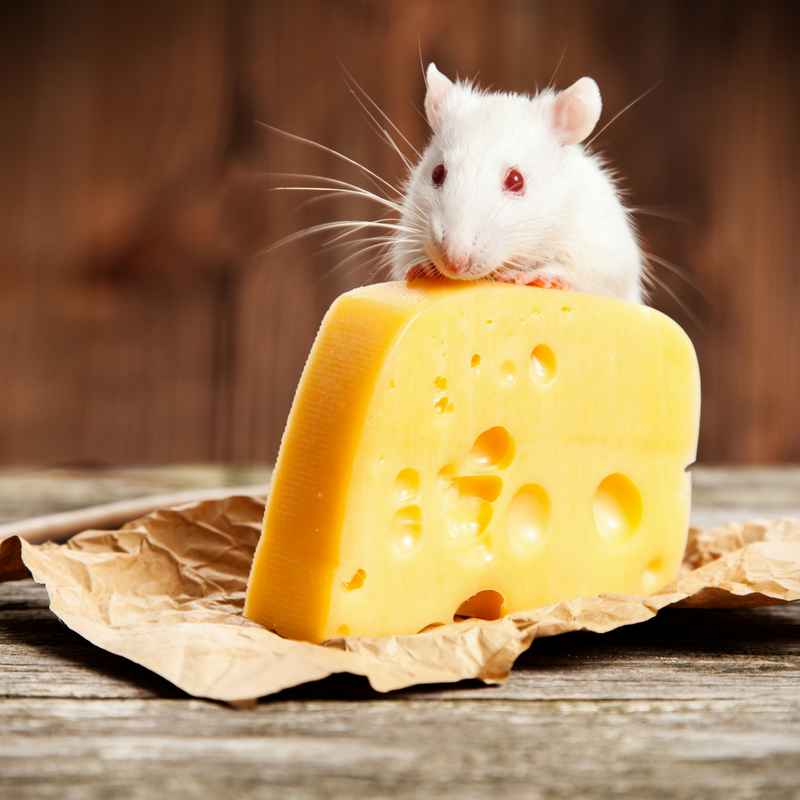Can rats eat cheese? – is an all too common question rat owners ask in forum and in groups.
The short answer is both a “Yes” and a ‘No”.
How is that even possible when rats are often portrayed in cartoons as loving cheese?
Do Rats eat Cheese?
It depends on the cheese offered.
NOT ALL CHEESE are fine for rats to snack on. But, even safe cheese for rats should be fed in moderation because they’re full of fat.
Now, some cheese types MUST BE AVOIDED at all costs as it may spell doom if your pet rat eats it.
ALSO SEE: Grain Mix Recipe for Rats
Can Rats eat Cheese – What Kind is Safe & Which is Unsafe?
Although some can be safely fed to rats, other cheese type isn’t, even as occasional treats.
Note: Not EVERY RAT is LACTOSE INTOLERANT, individual rats can be. So, it is nice to watch out for signs that tell they aren’t doing well with cheese, such as loose stools or diarrhea.
The best and safest cheese for pet rats are one that are semi-hard or hard cheeses that go through a washing process that rids the balls of excess. The result is a cheese with a much lower fat and lactose.
Colby Cheeses is an example of such cheese.
Pet Rats Can Safely Have:
- Gouda
- Cheddar
- Red Leicester
- Colby
- Appenzeller
- Emmental
- Gruyere
- Edam
The cheeses listed above are fine to feed your rats if they are either produced from goat or cow’s milk. As long as you’re feeding a plain variety without any additions of certain grains, chilies, and nuts.
Cheeses Your Pet Rat Must Avoid:
There are particular cheese types that aren’t healthy for pet rats as a result of the processes and ingredients they undergo during being made or maturing.
Certain cheeses like Mozerella, Brie, and Feta are also unsafe for rats because they’re too soft, and chewy (even though they have no bad ingredients or undergo bad food processing).
Soft cheeses are harmful because they are way too chewy for rats who lack molars to break down food before swallowing. That means, they will easily choke on meals that are too “gloopy” for them. Because they lack natural gag-reflex, choking is a bigger life-threatening even in rats.
Cheeses Rats Cant Have:
- Camembert
- Blue Cheese
- Mascarpone
- Cream Cheese
- Mozarella
- Feta
- Ricotta
- Queso Blanco
- Cottage Cheese
- Brie
- Stilton
- Gorgonzola
There isn’t a particular list of cheeses rats can’t have list that is ever complete. However, you can avoid any possible casualty by avoiding any cheese that fits into the category we have described above.
You should always do deep research on the type of cheese you are thinking of feeding your rats before feeding them. Use your common sense to decide whether it’s safe or not too.

Can Rats eat Vegetarian and Vegan Cheese?
Absolutely! Like standard cheeses containing animal products, rats too can have cheese without animal products in them – BUT – avoid checking the ingredients of these cheeses as the manufacturers might have added ingredients that are not typically present in common cheese and could be somewhat less rat-friendly. Or they might contain ingredients that are meat-product supplements – things added for effect rather than nutrition – that you might wish to avoid.
ALSO SEE: How Much Water do Rats Need?
For instance, a lot of widely consumed vegetarian and vegan cheese use fungi, nuts, palm oils, or herbs rather than milk proteins and other thickeners to help them solidify.
However, there are lots of cheese products out there that is hard to write about.
So, ensure you read the labels for yourselves before buying or feeding your rodent baby.
Note: It doesn’t mean you can’t feed your rats little bits – ONLY use your sense to judge what amounts and frequency to feed.
Can Rats Eat Processed Cheese?
Because can food isn’t even considered a desirable option for humans here, the ideal answer is No! rats can’t have processed cheese.
But, some humans have eaten, are eating and thriving well on it – why would you deny small bits of these to your pets if you had them in store?
Can rats eat Blue Cheese?
There have been no scientific or medical explanation as to whether blue cheese is safe or not. However, some rat owners feed their rats blue cheese and have seen no immediate or life-threatening side effects.
Do Rats eat Cheese Puff?
Absolutely! But in small amounts.
Can rats eat Cheese balls?
Yes! My pet rat go nuts for them.
Can Pet Rats eat Cheese and Onion Crisps?
Since this is fatty in nature, I’d be careful in feeding my pet rats. A little amount won’t hurt but I would avoid it overall.
Can Rats eat Cheese Cake?
I see no reason(s) why they shouldn’t.
How Should You Feed Pet Rats Cheese?
Once a week is fine to feed cheese and it should be offered as an occasional treat in small amounts.
Conclusion:
Cheese is good but remember, cheese is high in fat and it’s not good for their health to give them too much cheese!
If this article has helped you out in any way, let us know in the comment section or share it with other rat owners to spread the word!

![Can Rats Eat Cheese? [Balls, Puffs, Cake]](https://basicrat.com/wp-content/uploads/2020/10/Can-Rats-Eat-Cheese-1.jpg)


